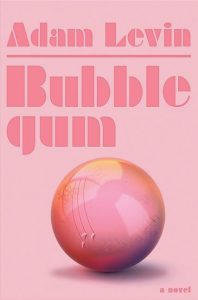
This week’s Fab Five includes Parul Sehgal on Lynn Pastell Harper’s On Vanishing, Colm Tóibín on The Dolphin Letters, Garth Risk Hallberg on Adam Levin’s Bubblegum, Nadja Spiegelman on Virginie Despentes’ Vernon Subtex 1, and Laura Miller on Lawrence Wright’s The End of October.
“In her 70s, Iris Murdoch began documenting the fraying of her memory in her journals. ‘Find difficulty in thinking and writing,’ she noted. ‘Be brave.’ She would write one more novel, Jackson’s Dilemma, before receiving a diagnosis of Alzheimer’s in 1997. Drafts of a letter from that year were later discovered among her papers. ‘My dear,’ she wrote, ‘I am now going away for some time. I hope you will be well.’ A following version was just scrawls. What does it mean ‘to go away’? What parts of us are snatched away by Alzheimer’s and what parts remain? In a searching, poetic inquiry into dementia, Lynn Casteel Harper delves into a disease that afflicts some six million Americans and yet seems shrouded in secrecy, its sufferers hidden away in institutions, its symptoms cloaked in a peculiar, telling language of terror and contempt … She writes without fear or aversion but with a robust, restless curiosity, a keenness to reframe our understanding of dementia with sensitivity and accuracy … Sontag wrote that we are dual citizens of the kingdom of the sick and the kingdom of the well. In her beautifully unconventional book, Harper examines the porousness of the borders, the power of imagination and language to grant better futures to our loved ones and ourselves.”
–Parul Sehgal on Lynn Pastell Harper’s On Vanishing: Morality, Dementia, and What It Means to Disappear (The New York Times)
“The letters are worth reading not merely for what they tell us about Hardwick and Lowell but also because they are the direct source of many of the poems in Lowell’s book The Dolphin, published in 1973, in which he shaped or remade Hardwick’s letters into sonnets without her knowledge or agreement … Lowell replied to say that she needn’t be shocked: his putative book did not, as yet, have a publication date; indeed, ‘it need not come out ever. It’s not defamatory.’ Within a few days, she replied: ‘I can’t speak about the book. I know only the shocked reaction of our mutual friends … Adrienne Rich didn’t like the book either. ‘The inclusion of the letter-poems stands,’ she wrote in the American Poetry Review, ‘as one of the most vindictive and mean-spirited acts in the history of poetry, one for which I can think of no precedent; and the same unproportioned ego that was capable of this act is damagingly at work in all three of Lowell’s books’ … Lowell emerges from his poems and letters as both thoughtless and tortured, entitled and damaged. Hardwick’s letters are more direct, her rage—and her interest in protecting her daughter—coming to the fore. But she is also formidable and smart, and there are moments when her daunting presence makes itself impressively felt … In the years these letters cover, Hardwick wrote her two best books, works in which her style became more tense and chiselled, her judgments more penetrating and precise. Any complexity absent in the letters is fully present in the books, as though she had been saving herself for something more worthy of her attention than Lowell and his new entourage.”
–Colm Tóibín on The Dolphin Letters, 1970-79: Elizabeth Hardwick, Robert Lowell and Their Circle (The London Review of Books)

“As of this writing, the xenobot remains homely and lab-bound, whereas the ‘Curio’—the theoretical center of Levin’s new novel, Bubblegum—is a mass-produced commodity of weaponized cuteness, a kind of unholy hybrid of Giga Pet and Mogwai and Turing machine: velvety soft, forearm-length, ‘a flesh-and-bone robot that thinks it’s your friend®!’ Still, the question this admirably bonkers and fitfully phenomenal book jazz-hands its way around is more or less the one now mooted by reality: Where does ‘functioning’ end and life begin? … Such giddy-making plot points demand more room than I’m giving them, so perhaps it’s no surprise this mammoth book should feel as lengthy as it is. Still, as if abashed by its own high spirits, Bubblegum relegates the highest-proof premises to back story, from which waft notes of sci-fi and satire … you don’t come to this writer for elegance of proportion. You come for comedy, for sensibility, for style; and in this sense Bubblegum is prodigiously sustaining … Like his close contemporary Joshua Cohen, no haikuist himself, Levin can make the kitchen-sink ambition of (mostly white, mostly male) midcentury postmodernism feel positively new, bidding fair for the maximalist mantle of a Pynchon or a Stanley Elkin.”
–Garth Risk Hallberg on Adam Levin’s Bubblegum (The New York Times Book Review)
“Underlying all of Despentes’s work is the concept of rape. It is the omnipresent possibility through which everything is refracted. There’s a war going on, her books insist, not so much between men and women as on men and women, waged through the constructs of gender. Masculinity, for Despentes, is the artillery that tears our bodies apart, while femininity is the drug of mass indoctrination. What she had learned from punk rock, she once said, was to look clearly at the world and declare it rotten … Vernon Subutex 1 is grander in its ambition [than Despentes’s other novels], but it sprawls, the voices of the characters blend together, and it’s occasionally sloppy … The misogyny and xenophobia of her characters are startlingly aggressive; the book is filled with a bitterness that doesn’t taste quite as clean as rage … a rather extraordinary act of creation and destruction, a realistic Paris evoked, transformed, and torn apart … But Despentes, with her ear for spoken French, is almost impossible to translate, and Frank Wynne’s translation is no better than those of her other books … Wynne, who is Irish, pulls from hacker culture, African-American vernacular, and slang from the north of England in an unfortunate mixture that undercuts a book whose greatest pleasure is the precision of its references.”
–Nadja Spiegelman on Vernon Subtex 1 and the career of Virginie Despentes (The New York Review of Books)
“The publication of Lawrence Wright’s The End of October, a thriller about a pandemic, in the midst of an actual pandemic is either the best possible luck from a marketing standpoint or the worst. Nobody can think about anything besides the COVID-19 virus right now, and Wright is a Pulitzer Prize–winning journalist, a staff writer for the New Yorker, and the author of bestselling books about 9/11 and the Church of Scientology. You can be sure that—even when writing fiction—Wright has done exhaustive research and carefully consulted dozens of experts. We’re all desperate to know how this thing will play out, and he seems eminently qualified to speculate on that. Furthermore, the early chapters of The End of October will strike many readers as uncannily prescient…Which makes the rest of the novel utterly terrifying. Wright’s scenario includes a temporary summer reprieve from new cases, followed by a vicious resurgence of his fictional virus. A cyberattack on the U.S. compounds the viral carnage, bringing down the internet and the power grid, setting off chains of explosions on gas lines. There are food shortages, deserted suburbs, dead bodies piling up, gangs of orphaned children, feral dogs roaming the streets, and heavily armed nutjob militias hopped up on conspiracy theories fed to them by Russian operatives … at the moment it may be more excitement than many readers can take. Zombie apocalypse yarns are fun enough when you’re cozily streaming Netflix on your living room sofa, but it’s another matter once the zombies are scrabbling with their bony fingers on your front door.”
–Laura Miller on Lawrence Wright’s The End of October (Slate)

